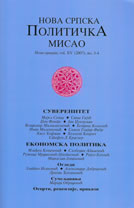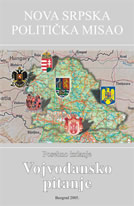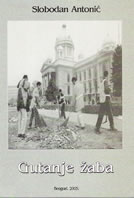| NSPM in English | |||
Ukraine: Post-orange challenges |
 |
 |
 |
| среда, 03. март 2010. | |
|
(Strategic Culture Foundation, 26.2.2010)
Before her confession of her own defeat, numerous attempts to extend the orange period were undertaken. The first serious attempt was done by Viktor Yushchenko in May 2009 when he overthrew a parliamentary decision from the 1st of April 2009 that fixed the date for the presidential elections for the 25th of October 2009. 400 out of 450 parliamentarians voted for this date, nevertheless Yuchchenko postponed the process till the 17th of January 2010. In the meanwhile his former partner from orange times, Yulia Tymoshenko worked on a de-democratisation of presidency by trying to change the constitution, so that the electorate would be excluded from future presidential elections. The measure of Yushchenko aimed at gaining time not so much for himself – he lost all the chances to get re-elected long before – but for a successor supporting the same Western pro-NATO-policy than he did. Arseniy Yatsenyuk, ex-foreign minister and high-degree Westerner could not profit from this postponement. The measure of Tymoshenko aimed at a possible parliamentary post-orange majority to avoid a dangerous public election that could have discredited the orange revolution post mortem. As it afterwards did. After the acknowledgement of Yanukovych ‘s victory, Ukraine could come back to normality. The obstacle to a normal development is the bare and narrow manner of the outcome. The country – still – is divided. Which truths? No commentary on Ukraine misses to state the division of the country. It is too evident to neglect this fact. Nevertheless Western discussions on the fundamental obstacle towards a necessary unification of the country persist in national, political and social basis of the split and hardly recognize the cultural dimension of the division, so to speak of the religious foundations.
In other words: modern Ukraine societies are confronted with three truths: Western universalism; the national Russian (or would it be more accurate to speak of a panslavic truth?); and the desperate attempt to constitute an Ukrainian national understanding. On the ecclesiastic level these three truths follow traditional legacies and lines. The universalism in form of the Union with Rome assures its followers with an enlightened concept of universal values. These values around the design of individuality and strict social relations based on one-to-one contracts and contractors include the moral believing, that these values were to be spread via proselitist conversion in a religious context and via enlargement of influence in a geopolitical context. The other edge of the country is animated by a pravoslavic society of national-oriented believe which includes the Ukraine in Moscow’s sphere of influence. In between since 1991 we can find the warriors of national independence on a purely Ukraine self-definition, new pravoslavniki with a new truth already admitted in the Ukraine National Church which is competing with Moscow. Mixed with social and economic diversities, these different truths, these different ways of looking at one’s and the other’s identity can turn into big troubles. What makes the situation even more dangerous is that the West-Roman, universalist concept finds its basis in a socio-economic, mostly agrarian periphery, whereas the concept of the Third Rome is predominant followed by in the industrial core of the country, located in the east; and the attempts to constitute an Ukrainian version of a cultural nation is strong in the administrative centres of the state. Elections alone cannot be the adequate means to overcome the different truths and find a common constituting state-identity. This can be easily proved by the simple fact that there was not a single region out of 27 where the presidential elections showed a balanced result with the exception of Transcarpatia (the explanation possibly lies in the fact, that there is a local minority of Rusyns in an Western Ukraine surrounding, being responsible for the narrow outcome). Peace with Moscow, cultural balance and economic troubles The main and visible political outcome of the different truths and concepts is discussed in the fields of geopolitics and culture. Hence the victory of Yanukovych includes new, post-orange orientations in these fields. If orange politics were based on a coalition between Western universialists and Ukrainian nationalists, the defeat of this coalition implies a change of the geopolitical and cultural orientation. Therefore post-orange Ukraine will try to find its peace with Moscow and restore cultural balance. Yanukovych declared many times to work in this respect. To extend the period of the presence for the Russian marine in Sevastopol and to re-introduce Russian as an official language were parts of Yanukovych‘s political programme. As the presence of the Russian fleet in the Black Sea is not compatible with Ukraine’s NATO-membership, Yanukovych is backed by a strong, at least indirect majority for his plan to extend the allowance to the Russian marine. Concerning the question of language the situation is hopefully de-blocked after almost 20 years of national radicalism. At the end of the orange period no strong power can be seen to fight for prolonging the exclusion of the Russian language. On the contrary: signs of cultural peace give hope for the future. Speaking about economy, hope is farer away. 2009 was a disaster. GDP shrunk by 15%, production by between 52% (building) and 22% (industry). Wages were reduced by 10%. The biggest challenge of Yanukovych‘s presidency is the economic one. If he fails here, social and political unrest are likely to regain the situation. Cultural clashes along the divisions described above could even put the territorial question on the agenda. Yanukovych therefore rides a narrow path if he follows the commandments and restrictions of the IMF which credited some 16 billion US-Dollars last year. More than a third of this sum still is not paid out. The IMF uses its credits to maintain and even harden the pressure on the country’s politics. The measurements of economic austerity thereby are numerous, IMF’s main requirement at the moment is: to increase the prises of gas and other sources of energy significantly on the local market by doubling. Before the elections only Yushchenko supported this unsocial measure, Tymoshenko and Yanukovych were against. Now, after the elections, this topic will be a key issue for the president. Is he willing to subordinate under the demands of the international creditor and thereby provoke social problems or will he stand clear to his positions he has taken before the elections? Yes or no? Inflation could be a means to avoid unrest in the first run, inflation could soften austerity measures. It would be read as opposition politics to Washington’s IMF still holding 6 billion US dollars for Ukraine in its hand. Western reception “Opponent of NATO winning elections in the Ukraine” was the title of the German “Handelsblatt” after the results were published. This view was symptomatic for German media. But after some distinguished commentaries on Yanukovych’s Soviet origin, his non-intellectual background and his anti-charismatic behaviour, German media accepted the results quicker than Tymoshenko did. NATO-enlargement is not a key issue for European politics in these days. Face to face with wars in Iraq and Afghanistan, awaiting possible new interventions in Yemen and Iran, European Union and Germany at first are not willing at the moment to enlarge its “engagement” in military adventures. Not even the “Georgian question” can actually mobilize strong anti-Russian feelings. Georgian president Saakashwili reflected this European position when he sent his congratulations to Yanukovych immediately after the results were published, although he remembered very well that it was Sevastopol where the Russian fleet came from in 2009 to support Abchasia. Yanukowytch’s idea to prolong its presence on Crimea did not hinder the Georgian president – and did not hinder European politicians and media to respect the result. This respect is a mutual one and it is clearly based on the strengths of the blue regionalists around the new president Yanukovych. If he is going to use this strength correctly, the end of the orange period could turn out to be a new geopolitical beginning. Yanukowych’s proposal to found a joint consortium of Ukraine, Russia and European Union on behalf of the transit of gas with mutual control could be a first step to make this respect economically true. http://en.fondsk.ru/article.php?id=2812 |
Остали чланци у рубрици
- Playing With Fire in Ukraine
- Kosovo as a res extra commercium and the alchemy of colonization
- The Balkans XX years after NATO aggression: the case of the Republic of Srpska – past, present and future
- Из архиве - Remarks Before the Foreign Affairs Committee of the European Parliament
- Dysfunction in the Balkans - Can the Post-Yugoslav Settlement Survive?
- Serbia’s latest would-be savior is a modernizer, a strongman - or both
- Why the Ukraine Crisis Is the West’s Fault
- The Ghosts of World War I Circle over Ukraine
- Nato's action plan in Ukraine is right out of Dr Strangelove
- Why Yanukovych Said No to Europe

.jpg)








 After ten months of tricky tactical games playing on electoral procedures and acknowledgements, the orange period of the post-communist Ukraine finally came to an end. As if the elections of 2004 were repeated, the electorate again voted for Viktor Yanukovych. This time the attempts to complain about falsifications were not successful; no tents were seen in the streets of Kiev, no social, no national protest heard. And Yulia Tymoshenko gave up to ask for a repetition 12 days after the results were published when she withdrew her appeal against the election result, which had been approved by the court in the meanwhile.
After ten months of tricky tactical games playing on electoral procedures and acknowledgements, the orange period of the post-communist Ukraine finally came to an end. As if the elections of 2004 were repeated, the electorate again voted for Viktor Yanukovych. This time the attempts to complain about falsifications were not successful; no tents were seen in the streets of Kiev, no social, no national protest heard. And Yulia Tymoshenko gave up to ask for a repetition 12 days after the results were published when she withdrew her appeal against the election result, which had been approved by the court in the meanwhile.













